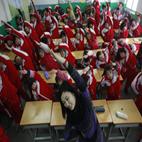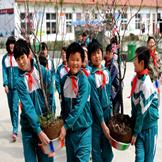题目内容
根据短文内容和首字母提示完成所缺单词。
George Ellet had a bright silver dollar for a New-year gift. He thought of all the fine things he might buy with it.
The ground was all covered with snow and e 小题1: looked beautiful.
So George p 小题2: on his hat, and ran into the street. As he went a 小题3: the street, he met some boys throwing snowballs. George soon joined t 小题4: . He sent a snowball at James Mason, but it missed him, and broke a window on the o 小题5: side of the street. George was so frightened that he ran off as fast as he c 小题6: .
S 小题7: , George stopped because he was very sorry for what he had done. He said to h 小题8: , “I ought to go back, and pay for the glass I broke with my s 小题9:.
At last he said, “It was w 小题10: to break the window, though I did not mean to do it. I will go and pay for it. If it takes all my money, I will try not to be sorry.”
George Ellet had a bright silver dollar for a New-year gift. He thought of all the fine things he might buy with it.
The ground was all covered with snow and e 小题1: looked beautiful.
So George p 小题2: on his hat, and ran into the street. As he went a 小题3: the street, he met some boys throwing snowballs. George soon joined t 小题4: . He sent a snowball at James Mason, but it missed him, and broke a window on the o 小题5: side of the street. George was so frightened that he ran off as fast as he c 小题6: .
S 小题7: , George stopped because he was very sorry for what he had done. He said to h 小题8: , “I ought to go back, and pay for the glass I broke with my s 小题9:.
At last he said, “It was w 小题10: to break the window, though I did not mean to do it. I will go and pay for it. If it takes all my money, I will try not to be sorry.”
小题1:everything
小题2:put
小题3:along
小题4:them
小题5:other
小题6:could
小题7:Suddenly
小题8:himself
小题9:snowball
小题10:wrong
试题分析:这篇短文主要记述了乔治在街上玩雪仗时,失手打碎了别人的窗户。最后意识到错误,并打算用自己的零花钱赔偿的故事。
小题1:联系前文描述,可知此处指的是一切看起来都很美丽。结合语境及首字母可知填不定代词everything,每件食物,一切事物。
小题2:联系下文,可知此处指的是他带上帽子。短语put on穿上,带上。结合语境可知本句描述的是过去发生的动作,故用一般过去时态。Put的过去式和原形动词词形一致,故填put,放。
小题3:结合语境可知此处指的是他沿着大街走的时候,根据首字母可知填介词along,沿着。
小题4:联系前文,可知此处人称代词指的是前文的那些男孩,故用复数形式,做介词宾语用宾格,根据首字母可知填宾格人称代词them,他们。
小题5:结合语境可知此处指的是街的另一边,根据首字母可知填other,两个中的另一个。
小题6:结合语境可知本句指的是他以尽快的速度跑开。由于本句描述的是过去的动作,故谓语动词用过去时态。根据首字母可知填can的过去式could,能够。
小题7:联系下文,可知此处指的是,他突然停住了。根据首字母可知填副词Suddenly,突然地。
小题8:联系下文,可知他是对自己说。根据首字母可知填反身代词himself,他自己。
小题9:联系前文描述,可知窗户是他用雪球打碎的。根据首字母可知填单数名词snowball,雪球。
小题10:结合语境可知此处指的是,打碎窗户是错误的。根据首字母可知填形容词wrong,错误的。
点评:首字母一直是英语考试中的难点,得分率比较低。解答此类题型的方法一般就是根据文章前后句子之间意思推断出词义,并结合首字母推断出所缺单词,然后根据该单词在句子中的句子成分,所起作用,确定单词词形,进行适当词形变化。注意动词,名词等一般要有词形变化,注意主谓语数的一致问题。而介词则没有词形变化。在叙事性短文中,谓语动词多为一般过去时态及现在完成时态,说明性短文中谓语动词多为一般现在时态。

练习册系列答案
相关题目




